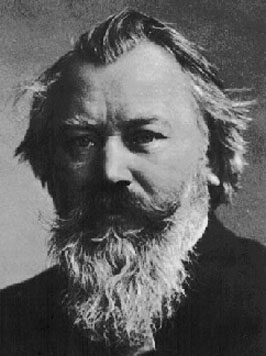July 19, 2007
Gratuitous Random Musickal Posting (TM)

I'm listening to one of Brahms' symphonies at the moment and am reminded of a famous anecdote connected with his Symphony No. 4 in E minor, often considered the harshest and most intellectual of the four symphonies he wrote. The American Symphony Orchestra takes up the tale:
In early October [1885], an august group assembled informally to hear Brahms and another composer, Ignaz Brüll, play through [a] two-piano arrangement [of the symphony]. On this occasion Eduard Hanslick and Hans Richter, respectively the most eminent critic and conductor in Vienna, were the page-turners; among the listeners were the surgeon Theodor Billroth, the critic Gustav Dimpke, and the musicologist C. F. Pohl. The scene was described by Brahms’s biographer Max Kalbeck:After the wonderful Allegro.. .I expected that one of those present would break out at least in a loud "Bravo." wouldn't allow my humble self to upstage in that way the master's older and more competent friends. Richter murmured something into his blond beard that from afar could be taken as an expression of approval. Brüll cleared his throat and slid diffidently and embarrassedly back and forth on his piano stool. The others remained persistently silent, and since Brahms also said nothing, a rather painful silence prevailed. Finally Brahms grumbled, "So, let's go on!" and gave a sign to continue; whereupon Hanslick heaved a sigh and quickly exploded, as if he had to relieve his mind and yet feared speaking too late: "For the whole movement I had the feeling that I was being given a beating by two incredibly intelligent people." Everyone laughed, and the two players continued.
I'm really not much of a Romanticist at all, but I love Brahms' symphonies, particularly the 1st and 4th. Alas, I don't have enough of a theoretical vocabulary to properly explain why, but I will say that his insistence on intellectual rigor channels the immense emotional energy of these pieces, giving weight to their feeling and preventing them from wandering off into the realm of mawkishness.
Posted by Robert at July 19, 2007 09:43 AM | TrackBackBrahms' music has an autumnal stoicism about it, unlike a lot of other Romantic music, much of which strikes me as sappy and overly sentimental. I've often thought that with programs including Brahms and other Romantic era composer's works, Brahms was the only adult in the room.
I have to admit that I don't get the Hanslick quotation at all, however: Have no idea what he could possibly have meant.
If you like Brahms, you ought to get the fourth symphony of the tragically neglected and under appreciated Russian Romantic composer, intellectual, and renaissance man/music theory genius, Sergi Ivanovitch Taneiev. It's like listening to Brahms with a Russian accent. I view his death in 1915 as the end of traditional music: There has been no great composer since, IMO.
Posted by: Hucbald at July 20, 2007 12:37 PM

 Image courtesy of the lovely and talented
Image courtesy of the lovely and talented 